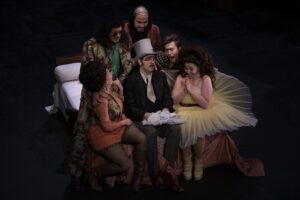
Opéra National de Paris Atelier 2022-23 Review: La Scala di Seta
By João Marcos Copertino(Credit: )
It is very hard to stage a Rossini opera—and even harder to stage his comedies. The maestro of Pesaro’s comic timing, uses and abuses of coloraturas, and overly complicated sexual plots are so ingenious that one nail out of place can compromise the whole machine. Paris Opera Atelier’s staging of “La Scala di Seta” (book by Giuseppe Maria Foppa) is not short of ambition and risks. The stakes are even higher when the performance takes place in Athénée, a theater so small that any small misstep is overly apparent to the public.
In short, the opera works well—but only well. The average operagoer will have a good time; the most devoted opera-lovers will admire the good intonation and fresh voices but will miss some of the vocal acrobatics. The singers are all extremely prepared, their Italian was very comprehensible, and all of them showed good command of the difficulties of Rossini’s coloratura. However, it is still noticeable in many moments that, though we are watching something with great potential, there remains something perceptibly academic.
The staging by Pascal Neyron is very competent in synchronizing the stage movements and music, but sometimes is made irritating by its own wittiness. All the action takes place in the most terrifying of bedrooms: a claustrophobic space with no sense of privacy whatsoever. The costumes are overly stylized clothes—and hairstyles—from a caricature of the 1960s, when youth liberation and conservatism were most emblematically in confrontation. The affectation of the hair and costumes, it seemed to me, sometimes sought to compete, to become objects of comedy in their own right, and thus diverted attention from the theatrical power of Rossini’s music. It might have worked for some audience members. But, it was not my cup of tea. It might also have worked better if the singers had sported their costumes with less awkwardness.
Interesting Performance Highlights
Although all the cast was competent, there were no moments of great coloratura variation in the final fermatas of any of the arias—perhaps following the dictates of the musical direction? Rossini’s coloraturas were well done, but sometimes all musical lines were a bit too austere for my own personal taste.
Margarida Polonskaya, as Giulia the protagonist, overcame all musical difficulties Rossini put in her way. Though initially somewhat shy on the stage, she won over the audience with a moment of beautiful lyricism in her aria, “Il mio ben sospiro e chiamo.” Her voice, however, apart from this lighter Rossini repertoire is better suited for heavier roles.
Unlike Polonskaya, Laurence Kilsby, as Dorvil, is an extremely agile, light, and high tenor. His voice shows great elasticity in the high notes, and a uniform presentation of all registers. The beauty of his tone, however, might be better showcased in lighter and earlier repertoire. That said, some of the most thrilling moments of the night were his high notes.
To my mind, the night’s most interesting performances came from the lower voices. Alejandro Baliñas Vieites (Blansac) has a potent voice and a very beautiful bass-baryton tone. Scenically and musically, he seemed deliberately inhibited, and to be preventing himself from having a better time on stage. Some of his stage gestures—such as his teasing of Giulia in the quartet—transmitted honesty but were too small for an operatic stage.
Charming Qualities Continued
Certainly, the singer who was in all respects most comfortable in his role was Yiorgo Ioannou as the charmingly inconvenient Germano. His voice suited Rossini’s musicality well. His biggest achievement, however, was to understand how much of Rossini’s comedy works: in order to make the comedy happen, the singers must be extremely serious in their struggles. Ioannou made his Germano extremely pathetic. Even in his unflattering wig he managed to find some joy. It was not without surprise that, at the end of the night, he got the most welcoming—and last—curtain call (in the cast group, of course).
The smaller roles were performed by the competent Thomas Ricart (Dormont) and Marine Chagnon (Lucilla).
The orchestra, a bit smaller than usual, sounded good under the command of Elizabeth Askren: the sounds were clear, and nothing sounded rushed. Overall, a production to see, especially if one wants to uncover of Rossini’s less performed works, but that panache and virtuosity that makes Rossini so enduring is still not there.


